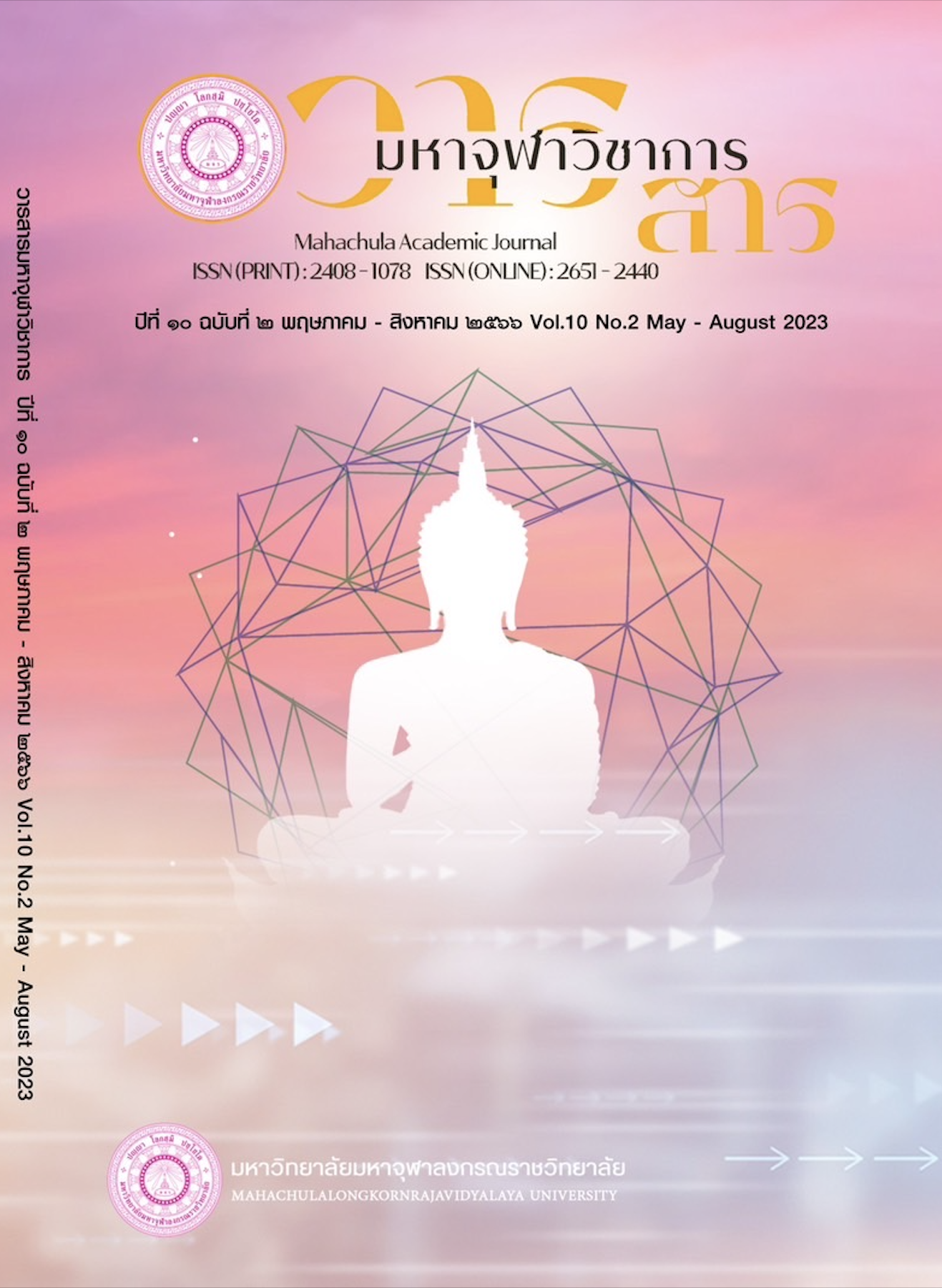Administration of Educational Institution Administrators According to Buddhist Principles
Main Article Content
Abstract
The objective of this journal was to study the administration of the educational institution administrators according to the Buddhist principles. The school administration was the key role of the administrators that specified the styles, methods and procedures in working systematically with the Buddhist principles as the leader and the practice of the organization. The administrators must hold on the Dutiyapapanika-dhamma (three qualities of a successful business): (1) Cakkhuma (shrewd), (2) Vidhuro (capable of administering business) and (3) Nissayasampanno (having a good credit rating). The personnel administration should apply the Sikkhattaya (the Threefold Training). Moreover, the administration in the schools should apply the 3 P: (1) Pariyatti (study of the Scripture), (2) Patipatti (the practice) and (3) Pativedha (realization), and the Sappurisadhamma (the seven qualities of a good man. The good administrators should select the ways for administration suitable and efficient for the goals. Moreover, the administration should apply the science and art.
Article Details

This work is licensed under a Creative Commons Attribution-NonCommercial-NoDerivatives 4.0 International License.
References
กิติมา ปรีดีดิลก.การบริหารและการนิเทศการศึกษาเบื้องต้น. กรุงเทพมหานคร: อักษรพิพัฒน์, ๒๕๔๒.
จรัส อติวิทยาภรณ์. ผู้บริหารยุคใหม่. ภาควิชาการบริหารการศึกษา คณะศึกษาศาสตร์มหาวิทยาลัยทักษิณ สงขลา, ๒๕๕๑.
ฉันทนา จันทร์บรรจง. หลักบริหารการศึกษา. กรุงเทพมหานคร: ม.ป.พ, ๒๕๔๑.
นพพงษ์ บุญจิตรดุล. ก้าวเข้าสู่ผู้บริหารการศึกษา. กรุงเทพมหานคร: บพิธีการพิมพ์, ๒๕๔๐.
นิพนธ์ กินาวงศ์. หลักการบริหารการศึกษา. พิมพ์ครั้งที่ ๒. พิษณุโลก: ตระกูลไทย, ๒๕๕๓.
พระเทพดิลก (ระแบบ ฐิตญาโณ). การบริหารจัดการองค์กรทางพระพุทธศาสนา. กรุงเทพมหานคร: มหามกุฏราชวิทยาลัย, ๒๕๕๓.
พระธรรมโกศาจารย์ (ประยูร ธมฺมจิตฺโต). พุทธวิธีในการบริหาร.พิมพ์ครั้งที่ ๔. กรุงเทพมหานคร: มหาจุฬาลงกรณราชวิทยาลัย, ๒๕๔๙.
พระมหาอุดร อุตฺตโร. พุทธวิธีการบริหารการศึกษา. กรุงเทพมหานคร: โรงพิมพ์มหาจุฬาลงกรณราชวิทยาลัย, ๒๕๖๕.
ภาวิดา ธาราศรีสุทธิ. หลักและทฤษฎีการบริหารการศึกษา. กรุงเทพมหานคร: สำนักพิมพ์มหาวิทยาลัยรามคําแหง, ๒๕๔๒.
วิลาวัลย์ วัชโรทัย. “คุณลักษณะที่พึงประสงค์ของผู้บริหารสถานศึกษาในยุคดิจิทัลของ สถาบันการอาชีวศึกษาภาคกลาง ๑ สำนักงานคณะกรรมการการอาชีวศึกษา”. วารสารมนุษยศาสตร์และสังคมศาสตร์ มหาวิทยาลัยราชพฤกษ์. ฉบับพิเศษ ครบรอบ ๑๕ ปี มหาวิทยาลัยราชพฤกษ์ (ธันวาคม ๒๕๖๔) : ๗๑-๘๓.
สมศักดิ์ คงเที่ยง. หลักการบริหารการศึกษา.พิมพ์ครั้งที่ ๒. กรุงเทพมหานคร: มหาวิทยาลัยรามคำแหง, ๒๕๔๒.
สำนักคณะกรรมการข้าราชการครูและบุคลากรทางการศึกษา.ประกาศสำนักงาน ก.ค.ศ. เรื่อง มาตรฐานตำแหน่งข้าราชการครูและบุคลากรทางการศึกษา. กรุงเทพมหานคร: สำนักงานฯ, ๒๕๔๘.
สัญญา สัญญาวิวัฒน์ และชาย สัญญาวิวัฒน์. การบริหารจัดการแนวพุทธ. กรุงเทพมหานคร: โรงพิมพ์แห่งจุฬาลงกรณ์มหาวิทยาลัย, ๒๕๕๐.
Dale, Ernest. Management: Theory and Practice. New York: McGraw-Hill, 1968.
Department of Health. A practical guide for schools to prevent the spread ofCOVID-19. Author, 2020.
Koontz Harold D. and Cyril O'Donnell. Principles of Management : An Analysis of Managerial Functions. New York: MC Graw-Hill, 1972.
William H. Newman. Charles Summer, & E. Kirby Warren. The Process of Management. 3rd ed. England Cliffs, New Jersey: Prentice Hall, 2006.
กระทรวงศึกษาธิการ. "พระราชบัญญัติการศึกษาแห่งชาติ พ.ศ. ๒๕๔๒ แก้ไขเพิ่มเติม (ฉบับที่ ๓) พ.ศ. ๒๕๕๓". [ออนไลน์]. แหล่งที่มา: https://shorturl.asia/cUy6g [๗ พฤษภาคม ๒๕๖๕].
มหาวิทยาลัยอาชีวะพิษณุโลก. "ผู้บริหารสถานศึกษากับความเป็นมืออาชีพ". [ออนไลน์]. แหล่งที่มา: https://shorturl.asia/5Z81e [๗ พฤษภาคม ๒๕๖๕].
สมหวัง วิทยาปัญญานนท์. "บริหารเชิงพุทธแนวท่านพุทธทาส". [ออนไลน์]. แหล่งที่มา: https://shorturl.asia/oFCZl
[๒๒ กุมภาพันธ์ ๒๕๕๙].
สันติสุข สันติสุข. "การนำทฤษฎีบริหารการศึกษามาใช้ในการบริหารโรงเรียน". [ออนไลน์]. แหล่งที่มา: https://www.gotoknow.org/posts/๓๒๒๕๒๐ [๒๒ กุมภาพันธ์ ๒๕๕๙].


